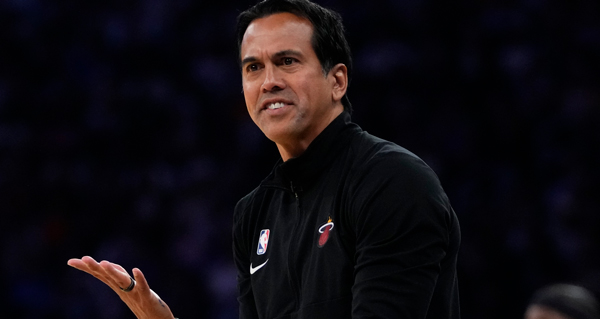In 2017, the Super Bowl was decided by the performance of a career journeyman quarterback who had never started a full season of games. Nick Foles, who went on to be known by a genitalia-referencing nickname, briefly transformed from a run-of-the-mill backup into one of the best field generals on earth. Luckily for him and the Philadelphia Eagles, this improbable shift happened during the six weeks that the NFL champion is decided—so that when he returned to underwhelming form for them and then the Jacksonville Jaguars, Chicago Bears, and Indianapolis Colts over the next five seasons, it didn’t matter in the hall of legend. He was still, and will always be, Big Dick Nick.
If the Miami Heat can win three more games in the NBA Finals, their legacy may prove similar. Jimmy Butler and Bam Adebayo should remain All-Star caliber talents no matter what, but what of their cadre of undrafted, overlooked gunslingers, all taking turns having the games of their life whenever the walls on their miraculous 8-seed run seem to be closing in on them? Gabe Vincent, Max Strus, Caleb Martin, Haywood Highsmith; how many Nick Foles can one team have? The fourth-worst team shooting from beyond the arc throughout the regular season, the Heat’s role players have propelled them to a commanding No. 1 three-point shooting spot in the postseason.
This isn’t supposed to happen in the NBA. For decades, 50 victories—or, in shortened seasons, their equivalent winning pace—have been a reliable indicator of contendership. The Heat, after winning just 44 times this season, eked into the playoffs after one terrible loss in the play-in bracket against the middling Atlanta Hawks, and then a very narrow win over the oft-floundering Chicago Bulls. It was not foreseeable that they would then proceed to defeat the most talented teams in the sport, flaring an unusual ability to find and corner the frightened child within some of the NBA's biggest stars. That their brilliance should continue for even one more game is unlikely, but since the unlikely has been happening for nearly two months now, it seems time to reclassify the team.
The main reason for this is not their aforementioned hot shooting, but something less measurable; it is obvious, though, that it exists. This is their ability to construct—sometimes on the fly—quizzes that their opponent cannot pass. Whatever the other team’s blind spot, they will find and exploit it, even when no one else even knew it was there. If said flaw is not large, the Heat will be capable of accumulating all your smaller ones into a big enough edge to win. Death by way of pin pricks that never cease, adding up to a fatal gash.
Brains and nerve have never taken a team this far, and the other shoe, their persistent skeptics have been saying, must soon drop. But perhaps it already has, and it’s wrapped around Miami's own fated foot. The Denver Nuggets, who hadn’t lost in a month—or at all in Colorado, this postseason—looked frazzled in Game 2 of the NBA Finals Sunday night, scurrying for answers and stripped of their vigor as the Heat won at altitude, displaying consistent transition defense and vexing variants of their zone defense all night long. It robbed all but Nikola Jokic of their confidence, dragging the best postseason offense into a muddied pace and much less dynamic half-court sets.
It would be hard to say that Jokic himself was gunked up much by the Heat’s radar-scrambling stratagems, since he scored 41 efficient points and looked once again unguardable in the post. But he did uncharacteristically log more turnovers than assists. Problem-solving against a team on a historically sharp gameplan run will be a bigger challenge than the two-time MVP has yet faced, especially if his teammates can't reach his level; it's do-or-die time for all the teammates who orbit around Jokic to prove they can score without relying on his vision, gravity, and touch, as Miami is determined to mitigate these powers by guarding him straight-up more often than not, in order to keep the weak side clogged and rim cutters stuck in stasis.
If Denver is not creative and forceful enough to break free from Heat coach Erik Spoelstra’s matrix of frustrating X-and-O riddles, his maniacal Spring will make for one of the most legendary brain sessions that basketball has ever seen. Relentless in his optimization, every Spoelstra press conference has been a masterclass in the performed madness that his team has internalized. Every time he taps the podium table nervously, or points his fingers down to it declaratively, you can add several more impossibly victorious possessions to his team’s next game. The Heat are not big, strong, fast, athletic, or skilled enough, but when you listen to him speak, and when you watch them play, it doesn’t seem to matter. Though they remain underdogs in almost every quantifiable way, the Heat have very few improbabilities left to demonstrate before they’re champions.



